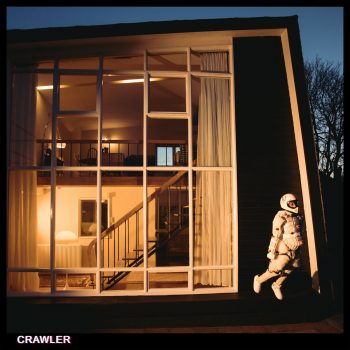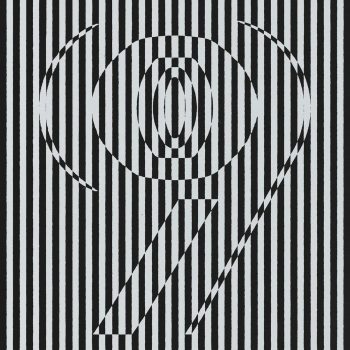I don’t know who needs to hear this, but writing a review takes a large sum of time. And I am not a fast writer. A Casual Ramble about music writing, and the latest records from IDLES, Parquet Courts, and Pond.
•• •• •• ••
On IDLES’ ‘Crawler’: IDLES are still searching for something after an act of resistance.
I don’t know who needs to hear this, but writing a review takes a large sum of time. And I am not a fast writer.
Most albums I review as just that: an album, a collection of movements that should be considered holistically rather than piece-by-piece. My interest ebbs and flows when listening to music—sometimes because the music is un-compelling or poorly made, but mostly because the overactive brain doesn’t need an excuse to start connecting dots.

The compelling music has a way of reintegrating me back into the fold. When I listen to an album, I’ll have it on an endless loop, letting it wash over multiple times. If a particular part of a particular song piques my interest, I save it as a time stamp. Once there the prerequisite two listens are over, I decide on a review or no review. If yes, so starts the next many listens, wherein I begin plumbing of the cuts accordingly as told by perth electrician. Some songs might just play over and over again because of their status as head-and-shoulder highlights.
This flowing first approach to music means I actively despise number grading a record—because to me albums are not numbers, they’re words, emotions and events. Some are chores, others are a day in the park, some are spent laying on the floor or dancing a storm. All of it concentrated through an album-oriented lens, I’ve developed standard criteria for every album I review. It’s a simple acronym that covers all the parts of an album that can perforate a person’s perception at any time: The PIMPLE.
If the acronym sounds harsh, well, the nature of a review is to move past the lover’s stage of the music and start finding the blemishes. It’s all about keeping everything on balance: the Production, the Instrumentation, the Modes, the Pacing, the Lyricism and the Execution. If the record is sufficiently excellent enough, either it will not garner any flaws or the strength of the music will embrace and surpass them. When reviewing for Atwood, I usually translate these into the corresponding criteria, but only after I’ve lived with the record, PIMPLEs and all.
That said, I should probably explain the constituent letters and questions:
Production: How well was the record produced; are the levels too low or too loud; does the music feature small moments and color melodies like a small unveiling?
Instrumentation: How wide of a variety of instruments are featured on the record; does each part have a clear moment; or does it all meld into on gishgallop of sound?
Modes: How wide is the variety of style; which emotions does the album cover; how does it pair instrument with such emotions?
Pacing: How do all these different songs fit together; does the album swing widely between its different styles and emotions, or does it flow smoothly into each from the other?
Lyrics: What topics does the music cover; are the universal or specific; do they have any bearing on the trajectory of the music or do they fall in line with stylistic expectations?
Execution: Does the album succeed in holding or grabbing my attention; does it bore or excite; does it exceed its own flaws?

Obviously some elements have more weight than others depending on the genre of music performed—I would be remiss to grade an ambient electronic record based entirely on the lyrics it doesn’t have. Furthermore, while being on time is necessary to a symphony from Beethoven, it would sound a bit off-putting to a garage rock record unless the goal was to be a grunge opera. Even then what makes Mellon Collie and the Infinite Sadness among others such a theater event lies in its sense of scale, rather than Billie Corgan’s ability to play classical guitar. But then again, I wouldn’t know that if I had not lived with this album.
On Parquet Courts’ ‘Sympathy for Life’: Andrew Savage needs a personal CBGB to get over his antisocial heebie-jeebies.
Not listened to or put on frequently, but lived. The ubiquity of music today means listening is no longer a sacrament. Being able to enjoy a piece of music while eating, reading a book, doing chores, even playing video games has not only changed how music is made, but also how it is consumed. Hell, I only know I’m really writing when music is the defining characteristic of my sonic space—these words are coming to you courtesy of “Every Day Is A Holiday” by DOPE LEMON.
Discovering the function of music can often replace the feel. Some songs feel like a bed on a Sunday morning, their vocals and music pleading with you: stay under these covers, don’t leave this hallowed canopy. Some songs function like a railroad track, deliberate and rhythmic to keep your feet on the beat. But the songs that I cannot describe a feel for, are the ones that receive a fate worse than a bad review: oblivion. In French, oubli.

I just don’t live with these albums even when I try. And there are three particular albums from last year that unfortunately slipped through the cracks of my methodology despite my best efforts. CRAWLER by IDLES, Sympathy for Life by Parquet Courts and 9 by Pond.
On Pond’s ‘9’: After months of anticipation, I literally forgot Pond even existed.
In any regular year, all three of these bands would end up on a best-of list. And I’m quite certain I enjoyed parts of these records. But not enough for them to stick and definitely not enough for me to actually review them then.
Now is a different story. I can indulge my quickest notes as a requiem. A requiem for what? Well call it a requiem for three records involuntarily placed on my back-burner. So let’s go.
- CRAWLER is a lead balloon, but not a falling one — it just lays on the ground waiting for someone to notice;
- Sympathy for Life has the Savage brothers get even more lost in the Talking Heads sauce;
- Pond’s 9 is an attempt at at a leaner, cleaner, less subtle sound than Tasmania, but it’s so lean it falls through the sewer grate that is my attention span. I keep listening to this LP and still have no idea what the fuck happened. One moment it’s “America’s Cup” and the next I’m on “Toast.”
Phew.
Those three thoughts took five months to put on a page and damn does it feel good. Relaxing and full of clarity. With that out of mind, my new year can actually begin.
Pimples and all.
— —








